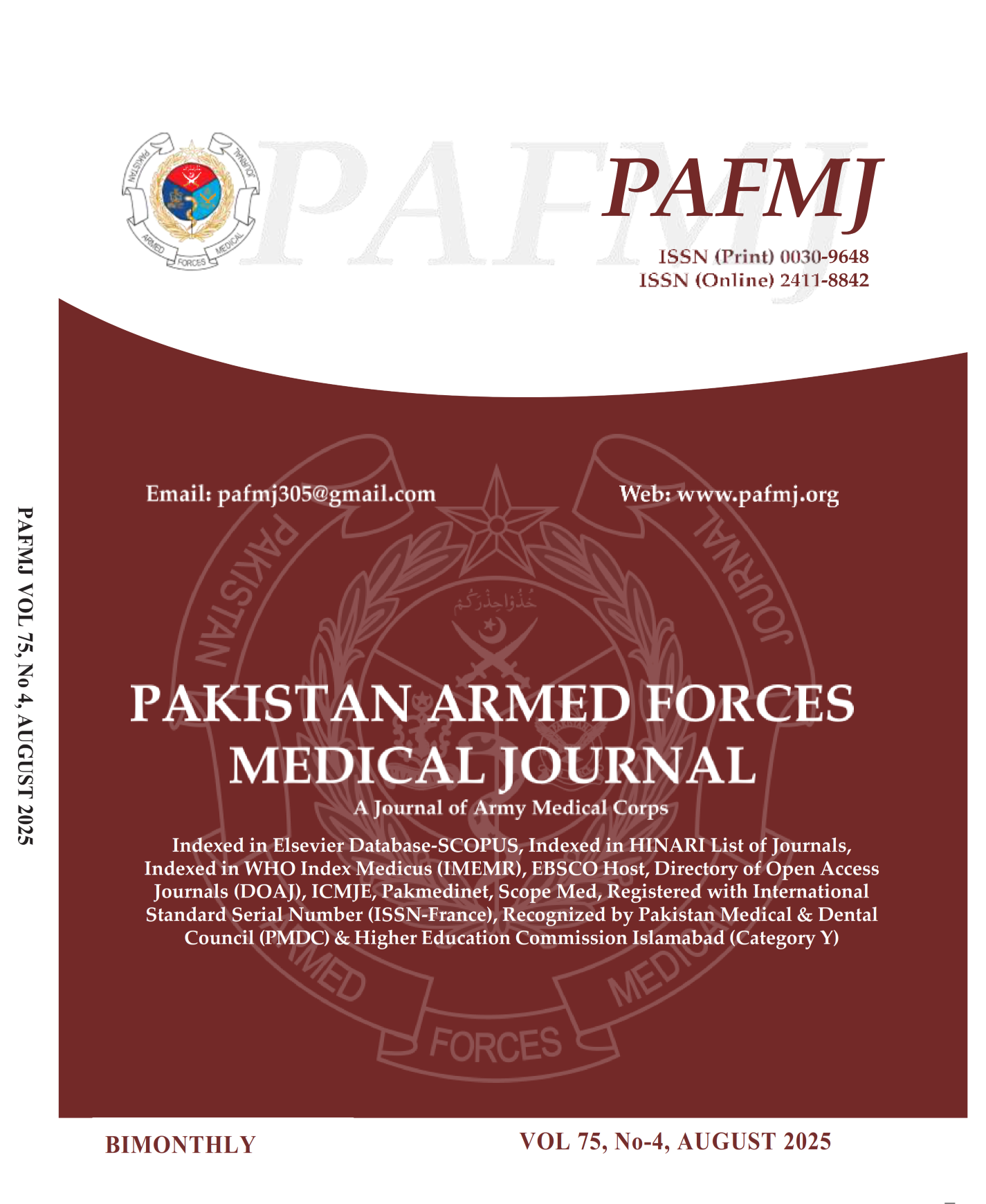Comparison of Dexamethasone and Local Anaesthetic Infiltration in Management of Postoperative Nausea and Vomiting in Pediatric Tonsillectom
DOI:
https://doi.org/10.51253/pafmj.v75i4.9181Keywords:
Corticosteroids, Dexamethasone, Local infiltration, Nausea, Pain, Postoperative, Vomiting.Abstract
Objective: Comparison of the effectiveness of intravenous Dexamethasone and pre-incision infiltration of local anesthetic among Pediatric tonsillectomy patients in reduction of postoperative nausea, vomiting, and pain.
Study Design: Quasi-Experimental Study.
Place and Duration of Study: Combined Military Hospital, Rawalpindi, Pakistan, from Jan to Jun 2022.
Methodology: Pediatric patients aged 04 to 13 years undergoing tonsillectomy under general anesthesia were enrolled in the study. Group-A was administered intravenous Dexamethasone 0.5 mg/kg (up to 16 mg), and Group-B was administered a 24ml of local anesthesia as pre-incision infiltration.
Results: A total of 126 patients enrolled in the study, with equal distribution in each group. In the post-anesthesia recovery unit, 10(15.9%) of patients in Group-A had vomiting, whereas 2(3.2%) in Group-B experienced vomiting (p-value 0.03). After 24 hours, the PONV frequency rose to 17(27.0%) and 6(9.5% respectively, in Group-A and Group-B (p-value 0.02), with compatible results at 48 hours, 3rd, 4th, and 5th day postoperatively. Group-A has shown higher consumption of postoperative analgesics in post post-anesthesia recovery unit and throughout from 1st to 5th day. 10(16.2%) and 21(32.8%) patients in Groups A and B, respectively, were able to drink during their PACU stay (p-value 0.05).
Conclusion: Local anesthetic infiltration is an effective modality for reduction of postoperative nausea and vomiting, along with analgesic potential in Pediatric patients undergoing tonsillectomy under general anesthesia.
Downloads
References
1. Yano T, Imaizumi T, Matsu-Ura H, Takahashi T. Relationship between dexamethasone added to periarticular anesthetic infiltration and postoperative nausea and vomiting following total knee arthroplasty under general anesthesia: a retrospective observational study. JA Clin Rep 2020; 6(1): 66.
https://doi:10.1186/s40981-020-00372-1
2. Grape S, Usmanova I, Kirkham KR, Albrecht E. Intravenous dexamethasone for prophylaxis of postoperative nausea and vomiting after administration of long-acting neuraxial opioids: a systematic review and meta-analysis. Anaesthesia 2018; 73(4): 480-489. https://doi:10.1111/anae.14166
3. Urits I, Orhurhu V, Jones MR, Adamian L, Borchart M, Galasso A, et al. Postoperative Nausea and Vomiting in Paediatric Anaesthesia. Turk J Anaesthesiol Reanim 2020; 48(2): 88-95.
https://doi:10.5152/TJAR.2019.67503
4. Zhang D, Zhou C, Wei D, Ge L, Li Q. Dexamethasone added to local anesthetics in ultrasound-guided transversus abdominis plain (TAP) block for analgesia after abdominal surgery: A systematic review and meta-analysis of randomized controlled trials. PLoS One 2019; 14(1): e0209646.
https://doi:10.1371/journal.pone.0209646
5. Reibaldi M, Fallico M, Longo A, Avitabile T, Astuto M, Murabito P, et al. Efficacy of Three Different Prophylactic Treatments for Postoperative Nausea and Vomiting after Vitrectomy: A Randomized Clinical Trial. J Clin Med 2019; 8(3): 391.
https://doi:10.3390/jcm8030391
6. Song ZG, Pang SY, Wang GY, Zhang Z. Comparison of postoperative analgesic effects in response to either dexamethasone or dexmedetomidine as local anesthetic adjuvants: a systematic review and meta-analysis of randomized controlled trials. J Anesth 2021; 35(2): 270-287.
https://doi:10.1007/s00540-021-02895-y
7. Selzer A, Pryor KO, Tangel V, O'Connell K, Kjaer K. The effect of intravenous dexamethasone on postoperative nausea and vomiting after Cesarean delivery with intrathecal morphine: a randomized-controlled trial. Can J Anaesth 2020; 67(7): 817-826.
https://doi:10.1007/s12630-020-01582-y
8. Desai N, Kirkham KR, Albrecht E. Local anaesthetic adjuncts for peripheral regional anaesthesia: a narrative review. Anaesthesia 2021; 76(Suppl 1): 100-109. https://doi:10.1111/anae.15245
9. De Oliveira GS Jr, Castro-Alves LJ, Ahmad S, Kendall MC, McCarthy RJ. Dexamethasone to prevent postoperative nausea and vomiting: an updated meta-analysis of randomized controlled trials. Anesth Analg 2013; 116(1): 58-74.
https://doi:10.1213/ANE.0b013e31826f0a0a
10. Walker SM. Pain after surgery in children: clinical recommendations. Curr Opin Anaesthesiol 2015; 28(5): 570-576.
https://doi:10.1097/ACO.0000000000000227
11. Aouad MT, Nasr VG, Yazbeck-Karam VG, Bitar MA, Bou Khalil M, Beyrouthy O, et al. A comparison between dexamethasone and methylprednisolone for vomiting prophylaxis after tonsillectomy in inpatient children: a randomized trial. Anesth Analg 2012; 115(4): 913-920.
https://doi:10.1213/ANE.0b013e3182652a6a
12. Baugh RF, Archer SM, Mitchell RB, Rosenfeld RM, Amin R, Burns JJ, et al. American Academy of Otolaryngology-Head and Neck Surgery Foundation. Clinical practice guideline: tonsillectomy in children. Otolaryngol Head Neck Surg 2011; 144(Suppl 1): S1-30.
https://doi:10.1177/0194599810389949
13. Messerer B, Stijic M, Sandner-Kiesling A, Brillinger JM, Helm J, Scheer J, et al. Is PONV still a problem in pediatric surgery: a prospective study of what children tell us. Front Pediatr 2023; 11: 1241304.
https://doi:10.3389/fped.2023.1241304
14. Elhakim M, Ali NM, Rashed I, Riad MK, Refat M. Dexamethasone reduces postoperative vomiting and pain after pediatric tonsillectomy. Can J Anaesth 2003; 50(4): 392-397.
https://doi:10.1007/BF03021038
15. Czarnetzki C, Elia N, Lysakowski C, Dumont L, Landis BN, Giger R, et al. Dexamethasone and risk of nausea and vomiting and postoperative bleeding after tonsillectomy in children: a randomized trial. JAMA 2008; 300(22): 2621-2630.
https://doi:10.1001/jama.2008.794
16. Windfuhr JP, Chen YS, Propst EJ, Güldner C. The effect of dexamethasone on post-tonsillectomy nausea, vomiting and bleeding. Braz J Otorhinolaryngol 2011; 77(3): 373-379.
https://doi:10.1590/s1808-86942011000300017
17. Nadeem A, Baig MN, Ayub N, Ahmed F. Effect on post Tonsillectomy pain control with IV and infiltrated Dexamethasone and infiltrated bupivacaine: A Randomized Controlled Trial. Annals of PIMS-Shaheed Zulfiqar Ali Bhutto Medical University 2021; 17(2): 114-119.
https://doi.org/10.48036/apims.v17i2.420
18. Naja Z, Kanawati S, Al-Khatib R, Ziade F, Naja ZZ, Naja AS, et al. The effect of IV dexamethasone versus local anesthetic infiltration technique in postoperative nausea and vomiting after tonsillectomy in children: A randomized double-blind clinical trial. Int J Pediatr Otorhinolaryngol 2017;92:21-26. https://doi:10.1016/j.ijporl.2016.10.030.
Downloads
Published
Issue
Section
License
Copyright (c) 2025 Muhammad Shahzad Bashir, Sana Abbas, Usman Saqib, Shakeel Ahmed, Adeela Khan, Hareem Azhar

This work is licensed under a Creative Commons Attribution-NonCommercial 4.0 International License.















